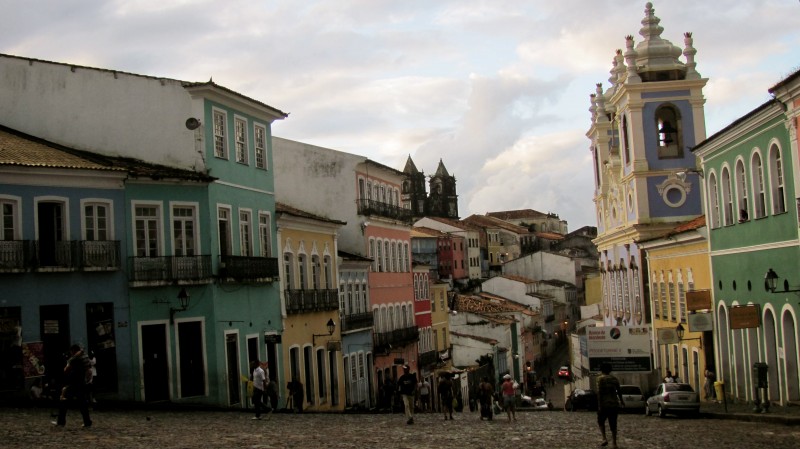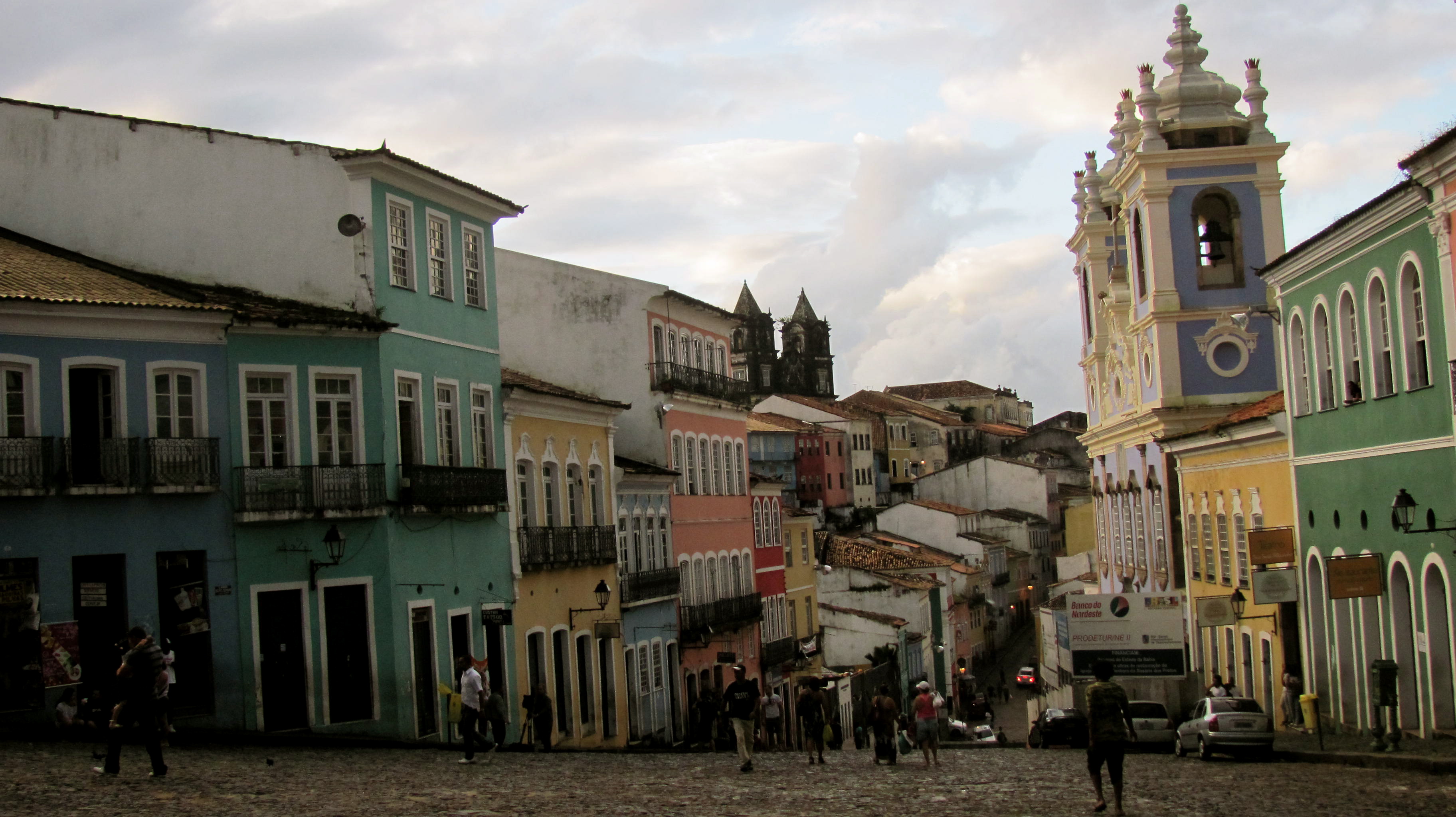If you’re going to be pickpocketed or mugged in Brazil, Salvador is likely to be the place.
Vagabondish is reader-supported. When you buy through links on our site, we may earn a small affiliate commission. Read our disclosure.
– Lonely Planet (South America on a Shoestring, 2007)
Salvador da Bahia is stunning, dipped in more beach than it knows what to do with. Crowded on the southern tip of a peninsula, like water pooling in the corner of a plastic baggie, the city brims, pushes against the ocean, threatens to topple over into the BahÃa de Todos os Santos.
Salvador is also famous for its crime. “You’re going to Salvador? Alone?” my Brazilian friends said. I’m living in Recife, the capitol of Pernambuco, for two months; nearby Salvador is my first, and only, solo venture outside the city.
I arrive at the airport Friday afternoon and hop aboard a bus that swings around the praia-lined perimeter of the peninsula to land in Pelourinho. The city’s historic center is now a World Heritage Site, colorful and cobblestoned, adorned with unexpected plazas and music””always music””wafting from somewhere.

Salvador, Brazil © Megan Kimble
Arriving at the golden glow of 5 p.m., turning new corners as sunset emerged, clomping past bright buildings, beside outdoor restaurants: it is wonderful, and I am glad I ventured here. Pelourinho is, according to Lonely Planet, where the action is, so I heed its advice, and find a hostel here””though I speak Portuguese, I’m still nervous to be alone, and I want to stay on the beaten track.
I meet folks at the hostel and the owner recommends a cachaça bar near the main plaza. It is soon clear that, after dark, Pelourinho is, in fact, not where the action is: the streets are empty. Six of us””two tall northern European gents, and three blond girls from Denmark””are not fifty meters from the hostel.
A dude sprints at me””I don’t see him until both his hands are around my neck, grabbing my necklace, breaking the gold chain. It’s too fast to really understand what he’s doing, so I resist before I realize that, really, I shouldn’t. My resistance is momentary and futile, as he’s already got what he wants and he’s already sprinting away, and I don’t even see his face. I’m left shocked and scared and with a short scratch where my necklace once was (and relief that I was not wearing earrings).
I’m not hurt, and I can completely afford to lose this necklace””in the category of “bad things to happen while traveling,” this is the best thing that could have happened. But, what unnerves me is not the object but the action””the violation of my space. Now, I feel like I’m being watched, scoped out, surveyed for anything shinny and bright that might be on my being; now, I’m uncomfortable and suspicious.
As planned, I spend the following day sightseeing in the Pelourinho. I take a bus to Igreja do Bomfim””the church that supposedly grants a wish for each knot tied on colorful ribbons””but spend barely twenty minutes snapping perfunctory photos, self-conscious of my camera. I visit the Mercado Modelo””the place to buy artesian wares in Brazil””and leave empty-handed. I feel like I’m checking sights off a list, fretfully filling hours before folding into the hostel at 5:30, when darkness descends.
I berate myself for my anxiety. It is ridiculous. When I lived in Nicaragua, my wallet was lifted out of my purse not once but twice. Each time, I shrugged, cancelled my debt card, and continued on my way, forgiving the unseen pickpocket because I knew most Nicaraguans weren’t like him.
But, here, I don’t know any Bahians, and so I don’t know how to re-calibrate my image of this city, where it seems that every traveler I meet has a similar story as mine. I wonder: what unforeseen circumstance warrants a change of plans? Do I push through, disregard my anxiety, or do I give into it, allowing it to frame my experience in Salvador?
I give into my anxiety, however unwarranted, and move on. I head to Barra, a barrio that crowds on the southern tip of the Salvador peninsula. It is less colorful, less musical; it is relaxed, suburban. There are no museums here, or capoeira classes: just beaches and ice cream shops. So, I don my swimsuit, eat a brimming acaà bowl for lunch, and wander along the edge of the peninsula.

Sunset Near Barra Lighthouse in Salvador, Brazil © Megan Kimble
Salvador is the only location in continental Brazil where you can watch the sun set over the ocean, and so I plan my day around 5:20 p.m., when I head to the Barra lighthouse. I’m delighted to see I’m not the only one with this plan: a gaggle of Brazilians are already spread on the grassy hill spilling into the ocean, blankets spread, guitars strumming. I plop down in an empty seat in the grass. We watch the sun strut over the water and applaud at 5:21 p.m., when she finally takes a bow and sinks into the sea.
A friend has recommended Bahia’s best restaurant for moqueca, a seafood and coconut stew, but it is a bus ride away. So, I follow the sunset watching crowd and queue up at a nearby acarejé street kiosk. I shell out four dollars for what looks like a fried ball of bread, but what is, I soon discover, magic: deep-fried black-eyed pea fritters, filled with cashew paste, tomato salad, and fried shrimp. The whips, the air turns cool, and I walk back to my hostel, in the dark, alone, and I feel comfortable.
I don’t end up checking off all the things I wanted to do in Salvador. I don’t make it to the famous Baile Folklorico, which starts at 8 p.m. at a theater in Pelourinho. I don’t go to the contemporary art museum, or eat moqueca. I don’t buy any bright Bahian souvenirs, or watch a capoeira roda, or go out samba dancing.
Instead, I find things that feel comfortable, doable, sans necklace. I finish a book, eat copious amounts of the magic bean fritters, walk miles along a brimming blue beach, and witness two spectacular sunsets. It feels like it was worth the trip.


